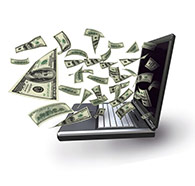НАВИГАЦИЯПОПУЛЯРНЫЕ СТАТЬИ
|
For the first nine months of 2009, gross domestic product (GDP) contracted 10 percent, the data showed. The Economy Ministry also forecast that in October, year-on-year inflation could come in at 9.9-10.0 percent. Russia`s industrial production grew 5.1 percent during September, according to official figures released, bolstering belief that economic recovery is under way. Output was still down 9.5 percent year on year, although that was less than the 12.6 percent drop seen in August, the Federal Statistics Service said. For the third quarter, output was up nearly 7 percent from the preceding quarter, the second consecutive quarterly rise. 20.10.2009 21:37 US industrial production up 0.7% in September 2009; Capacity utilization at 70.5% US industrial production rose for the third consecutive month in September, by 0.7%, more than the 0.2% economists were expecting, the Federal Reserve reported today. Adding to today`s better than expected reading, was a sharp upward revision to August`s output gain, from 0.8% to 1.2%. Output, which now stands at a level of 98.5, has advanced at an annual rate of 5.2% over the third quarter overall. That`s the first quarterly increase since the Q1 2008 and the largest gain since Q1 2005. Over the year, output is still down 6.1%. September`s increased output was due largely to a 3.5% increase in durable output, including a 7.4% increase in the production of automotive products. Nondurable output increased 0.5% in September. Within major industry groups, manufacturing output rose 0.9%, mining output rose 0.7%%, while utilities fell 0.7%. Capacity use in US factories rose to 70.5% in September, marking the third consecutive monthly increase. Economists were expecting capacity use to come in at 69.7% from the 69.6% rate first reported for August (since revised up to 69.9%). 08.10.2009 21:46 Eurozone GDP fell 4.8% year on year in the second quarter of 2009 The euro zone`s economy shrank more than previously thought in the second quarter of 2009, data showed, because contributions from household demand and trade turned out to be smaller than initially estimated. Gross domestic product in the 16-country area shrank by 0.2 percent in the April-June period quarter-on-quarter and by 4.8 percent in annual terms, compared with the previously reported falls of 0.1 percent and 4.7 percent, Eurostat said. Economists polled by Reuters had expected the European Union`s statistical office to confirm its previous estimates. A plunge in inventories was slightly smaller than previously reported, as the drop in stocks of finished goods took away 0.6 percentage point from the overall second-quarter result rather than the 0.7 percentage point reported previously. But this was offset by a downward revision of the positive contributions of household demand and trade -- that from consumers was zero and from trade, 0.5 percentage point. The recession turned out deeper than previously estimated in the Netherlands and Austria, Eurostat said. The data still showed that government efforts to support the economy with fiscal stimulus bore fruit as government expenditure added 0.2 percentage point. The data is likely to add to European Central Bank caution not to withdraw its monetary stimulus prematurely when the ECB meets to decide interest rates on October 8th. Economists believe the ECB will keep rates at a record low 1 percent until the third quarter of 2010 despite signs the euro zone may have returned to growth in the third quarter of 2009. 28.09.2009 23:46 The International Monetary Fund will raise its forecasts for the world gdp growth The International Monetary Fund now forecast that global activity will contract by 1.4 percent in 2009 and will expand by 2.5 percent in 2010, which is 0.6 percentage point higher than envisaged in the April 2009 World Economic Outlook. Also the International Monetary Fund has raised its forecasts for the euro zone economy this year and next but warns that the global recovery is still fragile. The latest draft of the IMF`s World Economic Outlook hikes its forecast for euro zone gross domestic product to -4.2 percent this year from -4.8 percent and raises next year`s outlook to zero from -0.3 percent. However, the global economic recovery remains "vulnerable to a series of shocks" including a more virulent diffusion of the new H1N1 flu virus. The Fund urged governments around the world to keep stimulus measures in place until the recovery is `well consolidated`. Euro zone unemployment will rise to above 10 percent this year and to "nearly 12 percent in 2011". 17.09.2009 00:46 Russia`s industrial output declined by 3 percent in August 2009 Russia`s industrial output declined by 3 percent in August, reversing growth of the previous two months and indicating that recovery is still a distant prospect, according to new government figures released. Industrial production fell 14 percent in January-August compared to a year ago, and 3 percent compared to July, the Federal Statistics Service said. Manufacturing was on the rise in June and July. The drop came a few weeks after several top officials announced a modest growth of the economy month-on-month. In the second quarter, GDP rose by 7.4 percent compared to the first quarter, although it is still down 10.9 percent year-on-year. Analysts said the low industrial output figures were largely unexpected. Yulia Tsyplyaeva, of Merrill Lynch in Moscow, said the results were disappointing but added that they don`t mean that Russia`s recovery ran out of steam. "The economy is still moving toward a way out of the crisis, although it`s happening at a slower pace than we would wish," she said. The economy`s rebound has proven to be "much more volatile" than expected. Russia has been hit harder by the global economic troubles than most other emerging markets, in part because of its heavy dependence on oil. The ruble has lost some 25 percent of its value since last summer and stock markets shrank by nearly 30 percent since August 2008 as oil and commodities prices took a hit. Observers and officials have since called for a diversification of the economy, but the recent surge in oil prices makes this goal less important. "There isn`t much urgency (of diversification) any more now that oil prices have stabilized," Ruben Vardanian, chief executive of Russia`s oldest private investment bank, Troika Dialog, said. "But this doesn`t change things. There is a lot to be done to diversify and modernize the country." Finance Minister Alexei Kudrin, meanwhile, said in televised comments that the third quarter would herald a full-fledged start of the recovery in Russia. President Dmitry Medvedev toned down the optimism, warning at a meeting with experts that quarter-on-quarter improvements suggest that "this is still a recession." He said in televised remarks the government expects Russia`s economy to contract by 8.5 percent this year. 11.09.2009 13:34 Japan`s gross domestic product rose a price-adjusted 0.6% on quarter The Japanese economy grew less than initially reported in the second quarter, highlighting the weakness of Japan`s recovery. The downward revision might not be a wholly negative sign for the world`s second-largest economy. Much of the revision was a result of a bigger-than-expected drop in inventories, something that will likely prompt companies to boost production to refill their warehouses. The Cabinet Office said Friday that gross domestic product rose a price-adjusted 0.6% on quarter, compared with the preliminary reading of a 0.9% expansion. That works out to a revised 2.3% increase in annualized terms, a slower clip than the initial reading of a 3.7% rise. Private economists had expected no revision in GDP growth. Companies have rushed to reduce them in the face of stagnant consumer demand. Because companies have made progress in cutting their inventories, they could soon begin to boost output again, analysts said. "The results should be taken positively," said Norio Miyagawa, an economist at Shinko Research Institute. "Firms succeeded in decreasing inventories at a very fast pace. It appears they can start increasing their output anytime, if demand for their goods increases." The revised GDP figures also highlighted that some key parts of the economy are still struggling. While Japan`s overseas markets are recovering, companies don`t expect a solid improvement soon in the domestic economy and are cutting expenses and staff. That is hurting consumer sentiment, leading to decreased spending and lower profits for firms. Capital spending, for example, was revised down to a 4.8% on-quarter fall from the preliminary 4.3% drop, in another reminder that companies are holding off from spending on capital due to the uncertain economic outlook. Private consumption, which makes up about 55% of GDP, increased a little less than expected. It was revised to show a 0.7% increase from the previous quarter compared with a 0.8% rise. 25.08.2009 15:30 Russia`s GDP declined by 10.2% in January-July 2009 year-on-year Russia`s GDP declined by 9.3% in July 2009 year-on-year and 10.2% in the first seven months of the year, a deputy economics minister said. However, Andrei Klepach said the economic slump has now ended, and that the economy is showing signs of revival. According to Economics Ministry data, investment increased 0.3% in July from June, taking into account the seasonal factor, but fell by 18.9% year-on-year. "Although the revival is not yet stable or intense, this is a major positive development, which means that the recession is now over, with slight growth emerging," the official said. However, he said it would take Russia several years to overcome the consequences of the crisis, and bring production volumes back to pre-crisis levels. Russia`s trade surplus halved to $9 billion in July 2009 against last July`s $8.7 billion, according to ministry data. The ministry has estimated that Russian exports in July stood at $25 billion against $24 billion in June, but fell by 47.2% against last July`s $47.3 billion. The ministry`s forecast for inflation is 0.3%-0.4% in August. The statistics service Rosstat put inflation at 0.6% in July, and 8.3% since the start of the year. 22.08.2009 16:07 GDP of Japan grew 3.7 percent from the year earlier in the second quarter The world`s second-biggest economy grew by 0.9pc in the second quarter – bringing to an end a year of severe recession, official figures showed. From the year earlier GDP of Japan grew 3.7 percent. The news means three of the seven G7 members which have now published statistics are expanding again. However, economists warned both that the fast pace of growth in the second quarter was unlikely to be sustained and that Japan still had many more years of expansion before it makes up for the output lost during the past year. Japan`s bounce owes a large part to its massive programme of fiscal stimulus, in which the Government boosted spending and cut taxes, at the cost of around 4pc of gross domestic product. The Government figures showed that exports grew by 6.3pc during the quarter while private consumption grew 0.8pc. Fears rally is over as shares tumble However, much like France and Germany, Japan`s nominal gross domestic product, which also takes into account the prices of goods, still fell by 0.2pc, since during the period prices dropped by 1.1pc. As such, the figures do little to dispel continuing concerns that the world remains close to a deflation trap as the weight of falling asset prices depresses growth. Unemployment is still high and rising even in economies which have recovered their growth. In Japan, the jobless rate has risen to a six-year high of 5.4pc. 17.08.2009 20:52 Industrial output in Russia shrank by 10.8 percent in July from a year before Industrial output in Russia shrank by 10.8 percent in July from a year before but rose by nearly 5 percent compared to a month earlier, the Federal Statistics Service reported August 17th, suggesting the worst of the recession is over. The yearly rate of decline in manufacturing was the slowest this year after a 12.1 percent drop in June, when the sector showed its first signs of stabilization. Russia`s economy shrank by 10.1 percent in the January-June period, but some analysts believe it has passed the worst of its economic downturn, with investment and retail sales figures in particular showing improvement. Russia is weathering its first recession in a decade as oil prices -- the backbone of its economy -- slumped and many foreign investors fled the country. |
Цитата дняБольшинство людей начинают интересоваться акциями, когда все остальные интересуются. Время интересоваться — это когда никто другой не интересуется. Вы не можете купить что-либо популярное и выиграть от этого. |




 11.11.2009 21:34 Japan`s industrial output rose 1.4 percent in September 2009 Japan`s industrial output rose 1.4 percent in September and manufacturers forecast further rises in the following two months, a sign that a recovery in the world economy continues to propel the export-driven Japanese economy. A recovery in factory production has been a major driving force in turning around the Japanese economy in April-June from its deepest recession in many decades. The rise in September output was smaller than the 1.6 percent increase in August but above the 1.0 percent rise expected by economists, according to the median estimate of a Reuters survey. Manufacturers surveyed by the Ministry of Economy, Trade and Industry expect output to rise 3.1 percent in October and increase 1.9 percent in November. Output is growing firmly, supported by the economic expansion in Asia. Recently, export growth is broadening to various products such as machines. 28.10.2009 22:24 Russia`s GDP contracts 10 percent in the first 9 months of 2009 The Russian economy contracted 8.6 percent in September, year-on-year, the Economy Ministry said, confirming its earlier estimate. The pace of contraction eased from the 10.5 percent seen in August. The ministry said the improvement was `linked both to a low base -- last year the fall in GDP accelerated in September -- and a resumption of monthly growth`. GDP has been growing on a month-on-month seasonal adjusted basis since June, and in September the increase was 0.5 percent.
11.11.2009 21:34 Japan`s industrial output rose 1.4 percent in September 2009 Japan`s industrial output rose 1.4 percent in September and manufacturers forecast further rises in the following two months, a sign that a recovery in the world economy continues to propel the export-driven Japanese economy. A recovery in factory production has been a major driving force in turning around the Japanese economy in April-June from its deepest recession in many decades. The rise in September output was smaller than the 1.6 percent increase in August but above the 1.0 percent rise expected by economists, according to the median estimate of a Reuters survey. Manufacturers surveyed by the Ministry of Economy, Trade and Industry expect output to rise 3.1 percent in October and increase 1.9 percent in November. Output is growing firmly, supported by the economic expansion in Asia. Recently, export growth is broadening to various products such as machines. 28.10.2009 22:24 Russia`s GDP contracts 10 percent in the first 9 months of 2009 The Russian economy contracted 8.6 percent in September, year-on-year, the Economy Ministry said, confirming its earlier estimate. The pace of contraction eased from the 10.5 percent seen in August. The ministry said the improvement was `linked both to a low base -- last year the fall in GDP accelerated in September -- and a resumption of monthly growth`. GDP has been growing on a month-on-month seasonal adjusted basis since June, and in September the increase was 0.5 percent. Автор:
Автор: 
 Комментарии: 0
Комментарии: 0 Просмотров: 20
Просмотров: 20


